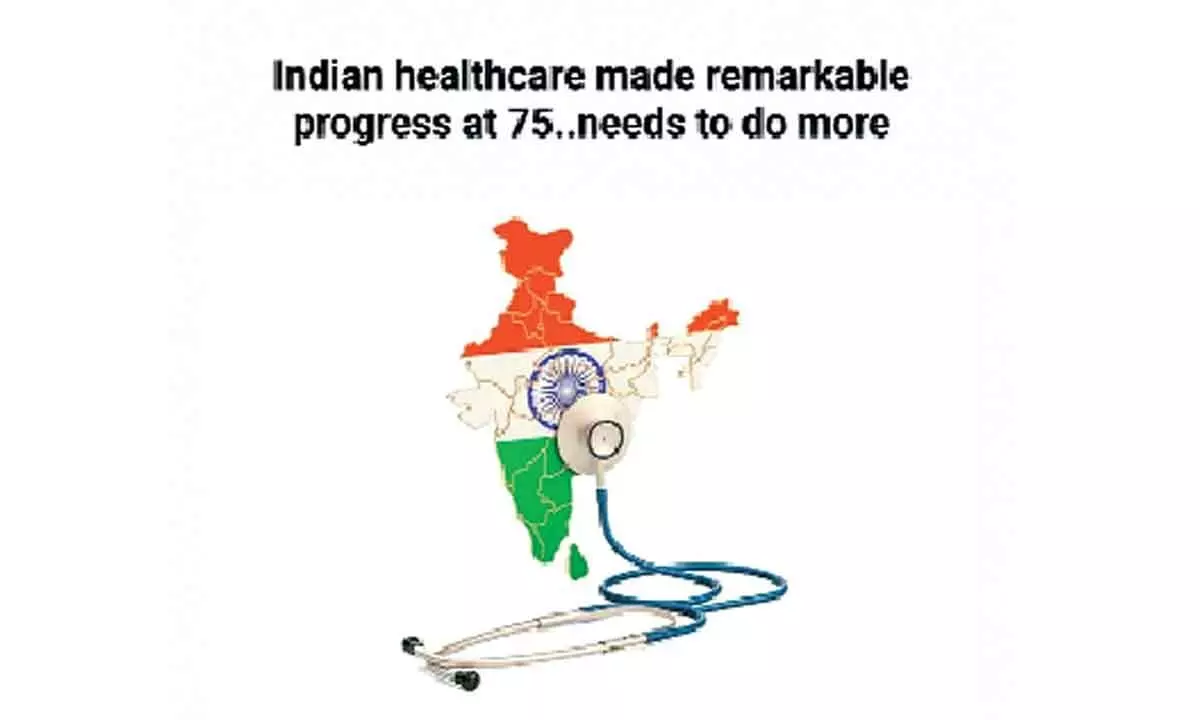Live
- What’s The Matter At Hand?
- Pollution levels continue to soar in Yamuna
- 540 touts held for duping passengers at IGI Airport
- Keen to bring Sports Bill in Budget Session: Mandaviya
- HC to hear plea against Kejriwal's bail in Jan
- SC grants bail to two in Waqf Board money laundering case
- Is ‘Deep State’ threat real or just a bogey?
- Sisodia not to report to police twice a week: SC
- No possibility of alliance with Cong for Delhi polls: Kejriwal
- Marriage an integral part of life: Top court enhances compensation to road accident victim
Just In
Healthcare in India has come a long way over the past 75 years


Healthcare in India has come a long way over the past 75 years. Core health indicators then and now tell us the journey India has made thus far.
Hyderabad: Healthcare in India has come a long way over the past 75 years. Core health indicators then and now tell us the journey India has made thus far.
Life expectancy rose to 70 years from 33 years; infant mortality dropped from 200 per 1,000 to 27 per 1,000; maternal mortality that was nearly 2,000 per 100,000 came down to 100 per 100,000. Institutional births rose to 89 per cent from 39 per cent in the last 15 years. Eradication of smallpox and polio stands out as the single greatest achievement. Doctors increased from 60,000 in the 1950s to 18 lakhs (13 lakhs allopathic and 5 lakh AYUSH doctors); nurses increased from 16,500 to 35 lakhs during the same period. Nearly 13 lakh ASHA workers connect communities to primary health care services across rural India.
But despite the progress, Dr Krishna Reddy Nallamalla, President, In Order Regional Director, South Asia, ACCESS Health International, said India ranks lower in many health indicators compared to countries that gained independence at the same time.
We have wide disparities between States, between genders, between rural and urban people, between castes, between the educated and the uneducated, and between formal and informal labour. According to him we account for 15 per cent of global maternal deaths and 27 per cent of global tuberculosis cases. 43 per cent of our children continue to be undernourished and 20 per cent continue to be vulnerable to diseases because of no or incomplete vaccination.
He further said the sex ratio at 935 females to 1,000 males places us at 192nd position in country rankings. Our public health expenditure at 1.2 per cent of GDP is one of the lowest in the world. Though out-of-pocket expenditure as a percentage of total health expenditure has declined from 62.4 per cent in 2014 to 48.8 per cent as per a recent study, it continues to cause financial hardships to many low- and middle-income families. Despite the progress, our health workforce and health infrastructure are grossly inadequate to meet the healthcare needs of people as per the growing disease burden
However, despite weak and fragile health systems, India displayed courage and resilience in absorbing the health shock it got from covid pandemic. The innovative and entrepreneurial spirit of India was evident in the way we ramped up the production of personal protection equipment and Covid testing infrastructure and the way we developed, produced, and administered our own vaccines. The rapid recovery of our economy is a testimony to our ability to absorb shocks and recover from them, he said.
He emphasised on the need for proper medical data. Dr Reddy said we still do not know how many excess deaths India really had over the last two and half years, how many children missed their vaccines, how many people missed their dialysis, how many with cancer, tuberculosis, HIV, missed their drugs, how many people suffered heart and brain strokes at home, how many could not deliver in the institutions, how many lost their jobs, and how many were pushed into debts and poverty.

© 2024 Hyderabad Media House Limited/The Hans India. All rights reserved. Powered by hocalwire.com






